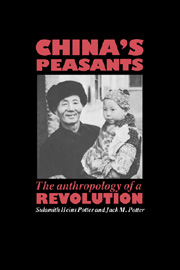Book contents
- Frontmatter
- Contents
- List of illustrations
- List of tables
- Preface
- Notes on the text
- Map 1 China
- 1 The old “feudal” order: Zengbu before Liberation
- 2 Establishing the new order
- 3 The ordeal of collectivization
- 4 The Cultural Revolution
- 5 Maoist society: the production team
- 6 Maoist society: the brigade
- 7 Maoist society: the commune
- 8 Impatient aspirations: transition to the post-Mao period
- 9 The cultural construction of emotion in rural Chinese social life
- 10 Marriage, household, and family form
- 11 Chinese birth planning: a cultural account
- 12 Lineage and collective: structure and praxis
- 13 Party organization
- 14 The party ethic: a devotion born of distress and enthusiasm
- 15 A caste-like system of social stratification: the position of peasants in modern China's social order
- 16 The Chinese peasants and the world capitalist system
- 17 The crystallization of post-Mao society: Zengbu in 1985
- References
- Index
6 - Maoist society: the brigade
Published online by Cambridge University Press: 02 December 2009
- Frontmatter
- Contents
- List of illustrations
- List of tables
- Preface
- Notes on the text
- Map 1 China
- 1 The old “feudal” order: Zengbu before Liberation
- 2 Establishing the new order
- 3 The ordeal of collectivization
- 4 The Cultural Revolution
- 5 Maoist society: the production team
- 6 Maoist society: the brigade
- 7 Maoist society: the commune
- 8 Impatient aspirations: transition to the post-Mao period
- 9 The cultural construction of emotion in rural Chinese social life
- 10 Marriage, household, and family form
- 11 Chinese birth planning: a cultural account
- 12 Lineage and collective: structure and praxis
- 13 Party organization
- 14 The party ethic: a devotion born of distress and enthusiasm
- 15 A caste-like system of social stratification: the position of peasants in modern China's social order
- 16 The Chinese peasants and the world capitalist system
- 17 The crystallization of post-Mao society: Zengbu in 1985
- References
- Index
Summary
The production brigade was a social, economic, political, accounting, and industrial management level intermediate between the teams below and the commune above. Brigade administration was the job of the Zengbu Party Branch Committee, and brigade leaders were all party cadres (see chapter 13). In their capacity as intermediaries, brigade cadres represented the teams and the peasants to the commune, and the commune to the teams and the peasants. Brigade cadres were responsible for supervising the teams and their productive activities. They mediated between the teams when there was conflict over such matters as irrigation water. The brigade also administered economic enterprises of its own, both agricultural and industrial, and social services, such as schools and the health clinic. The brigade was a corporate group with its own property, income, budget, and administrative staff.
The brigade's operations were centered in the brigade headquarters building, which contained an auditorium for large assemblies, a smaller meeting room for the branch party committee, offices, dormitory rooms for brigade cadres and visitors, a kitchen staffed by two cooks and a cook's helper, a dining hall, showers, privies, and a well. Nearby was an open-air theatre belonging to the brigade, for holding mass meetings, or for viewing movies or the performances of visiting opera companies. (During the Cultural Revolution, the brigade cadres had been denounced in this theatre.)
Also belonging to the brigade was a large brick building which housed the Zengbu branch of the state trading and supply organization.
- Type
- Chapter
- Information
- China's PeasantsThe Anthropology of a Revolution, pp. 129 - 142Publisher: Cambridge University PressPrint publication year: 1990



